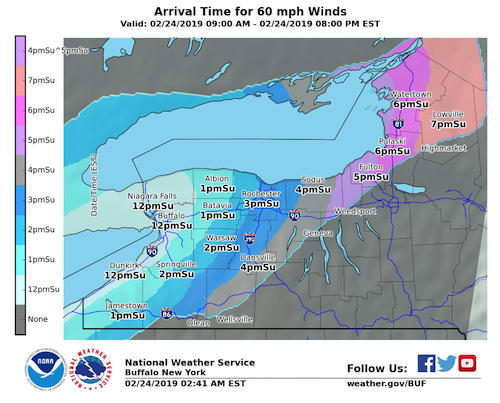Strong winds expected to create widespread power outages

There will be southwest winds from 30 to 40 miles per hour with gusts up to 75 mph. The strongest winds will be this afternoon and evening, said the National Weather Service in Buffalo.
“Strong wind gusts will bring down numerous trees and power lines and result in widespread power outages,” the Weather Service said. “Power may be out for several days in some areas.”
Shallow rooted pines will be particularly vulnerable. Property damage is also likely, especially to roofs and siding. Buildings under construction and old deteriorating buildings may be damaged significantly, the Weather Service said.
“Travel in high profile vehicles will be very difficult at times, and empty tractor trailers may be in danger of being blown off the road,” the Weather Service said.
The Governor’s Office issued the safety tips in anticipation of the powerful wind storm.
To prepare for potential power outages, New Yorkers should:
• Have a list of emergency numbers readily available.
• At home or at work, keep a battery-operated radio and flashlight on hand, as well as a supply of batteries. Keep an emergency supply of water, medications, and non-perishable foods handy. If you use medication that requires refrigeration, most can be kept in a closed refrigerator for several hours without a problem – check with your physician or pharmacist.
• Make sure you have alternative charging methods for your phone or any device that requires power. Charge cell phones and any battery-powered devices.
• If you have space in your refrigerator or freezer, consider filling plastic containers with water, leaving an inch of space inside each one – this will help keep food cold if the power goes out.
• If you have an electric garage door opener, locate the manual release level and learn how to operate it.
• Keep your car’s gas tank at least half-full; gas stations rely on electricity to power their pumps. If you use your car to re-charge devices, do not keep the car running in a garage, partially enclosed space, or close to a home – this can lead to carbon monoxide poisoning.
• Plan to have an alternative cooking source, such as a camp stove or outdoor grill. Follow appropriate safety rules for its use outside the residence.
• If you are considering a generator for your home, consult an electrician or engineer before purchasing and installing.
• Have extra blankets, coats, hats, and gloves on hand to keep warm.
• If you have a computer, back up files and operating systems regularly. Turn off all computers, monitors, and other devices when they are not being used.
• If you rely on anything that is battery-operated or power dependent such as a medical device, determine a back-up plan. For example, if you have a telephone that requires electricity to work, plan for alternate communication such as a standard telephone handset, cell phone, or radio.
• Learn about emergency plans in your area, including the location of the closest cooling and warming shelters, by visiting your state’s or local website.
If experiencing a power outage, New Yorkers should:
• Turn off or disconnect major appliances and other equipment, e.g., computers, in case of a momentary power surge that can damage these devices. Keep one light turned on so you know when power returns. Consider using surge protectors wherever you use electronic equipment.
• Call your utility provider to notify them of the outage and listen to local broadcasts for official information. Check to see if your neighbors have power. Check on people with access or functional needs.
• Use only flashlights for emergency lighting – candles pose the risk of fire.
• Keep refrigerators and freezer doors closed – most food requiring refrigeration can be kept safely in a closed refrigerator for several hours. An unopened refrigerator will keep food cold for approximately four (4) hours. A full freezer will keep the temperature for about 48 hours.
• Do not use a charcoal grill indoors and do not use a gas stove for heat – they could give off harmful levels of carbon monoxide.
• In cold weather, stay warm by dressing in layers and minimizing time spent outdoors. Be aware of cold stress symptoms (i.e., hypothermia) and seek proper medical attention if symptoms appear.
• In intense heat, consider going to a movie theater, shopping mall or cooling shelter. If you remain at home, move to the lowest level – cool air falls. Wear lightweight, light-colored clothing and drink plenty of water, even if you do not feel thirsty.
• If you are in a tall building, take the stairs and move to the lowest level of the building. If trapped in an elevator, wait for assistance. Do not attempt to force the doors open. Remain patient – there is plenty of air and the interior of the elevator is designed for passenger safety.
• Remember to provide fresh, cool water for your pets.
• Eliminate unnecessary travel, especially by car. Traffic signals will stop working during an outage, creating traffic congestion and dangerous driving conditions. If you must drive during a blackout, remember to obey the 4-way stop rule at intersections with non-functioning traffic signals.
• Remember that equipment such as automated teller machines (ATMs) and elevators may not be working.
• If the power may be out for a prolonged period, plan to go to another location, such as the home of a relative or friend, or a public facility that has heat.









































































